In a world where imagination knows no bounds, every child deserves the chance to embark on countless adventures, simply by turning the pages of a book. But not all are as fortunate. According to the Annual Status of Education Report, 40% of students enrolled in both public and private schools do not have access to books at their grade level.
Srishti Parihar, 33, wanted to address this gap. Her efforts would eventually culminate in the Share a Book India Association (SABIA) — an organisation that has been building libraries and hosting donation drives and book fairs along with offering underserved school teaching and educating programmes.
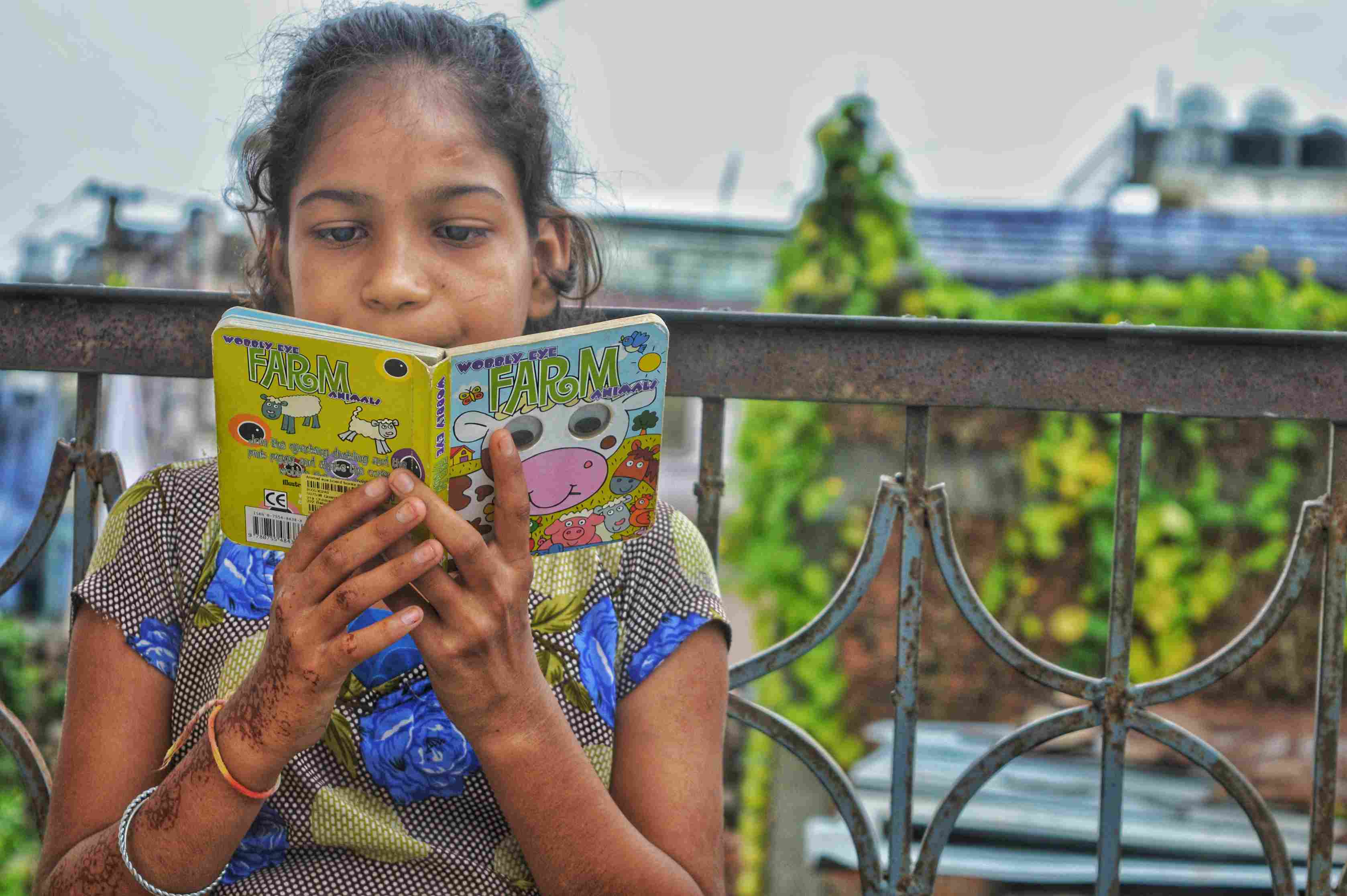
According to the Annual Status of Education Report, 25% of teens aged 14-18 struggle to read grade 2 level text fluently.
As a storyteller and writer, Srishti understands firsthand the transformative power of books. “Storybooks have impacted my life a lot when I was growing up. My love for reading is the reason I was able to do something with my life,” Srishti tells The Better India.
Advertisement
Through SABIA, she wants to help provide every child with access to books, and the ability to comprehend them. In 2024 alone, SABIA has extended its reach to over 30,000 children across 175 schools.
A UPSC aspirant and a voracious reader, Srishti was heavily invested in volunteer work. Recalling a conversation she had with a friend who had taken her house-help’s son to be admitted to a school under the Right to Education Act, Srishti says, “My friend mentioned that the children in that government school didn’t have a library. They didn’t have a place to read! That really stuck with me.”
As a product of a privileged education system where access to libraries was a given, many of us fail to consider that such a fundamental resource is missing for so many children. Srishti soon started a Facebook page, then moved to Instagram and formed a strong ‘Bookstagram’ community, where she rallied friends and family to donate books. It was here that they found a group of people who really understood and empathised with the cause.
Advertisement
Eventually, it grew into a full-fledged initiative that now includes a library development programme for rural and remote schools, a teacher training programme, book fairs, and donation drives.
A survey done by SABIA in March 2022 revealed that over 50 government schools in Rajasthan have not been able to implement ‘Padhe Bharat Badhe Bharat’, a government scheme which aims to provide extra reading material and inculcate amongst the students.
“So, even though there is a government scheme that wants to tackle this problem that has been identified, those books are never used,” says Srishti. “This is something that we have been working towards diligently. We are making all stakeholders within the school system, the teachers, and principals understand that it’s okay if the books are used and damaged. Otherwise, it’s pointless to even have them here,” she says.
Advertisement
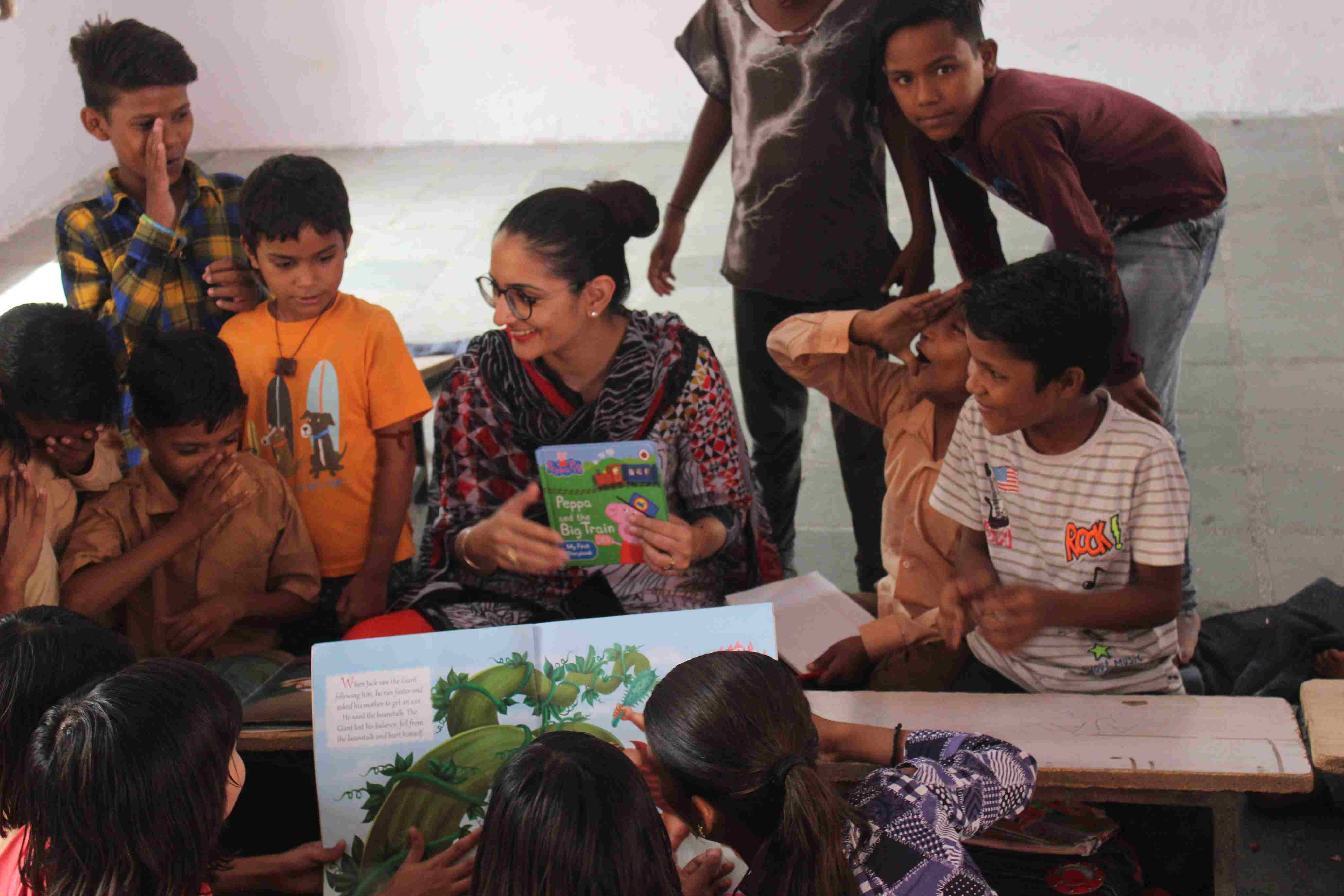
. “By focusing on social-emotional topics like mutual understanding and respect, we make sure that children improve academically while also developing crucial life skills,” says Srishti.
But it was not just access to books that was a problem.
“The situation was much more grave than we had imagined. Children in Class 8 would not know the alphabet. They were not able to differentiate between a ‘d’ and a ‘b’,” Srishti recalls. “They would recite poems in English because rote learning is embedded in us, but they wouldn’t understand what was being said.”
To fix this, not only does SABIA but they also conduct a library development programme that includes storytelling sessions, activities, and assessments to monitor the children’s progress.
Advertisement
“When we find out their grade level, most are at 0 or 1,” Srishti shares. This programme works to increase children’s reading levels and foster a positive, active relationship with books. “By focusing on social-emotional topics like mutual understanding and respect, we make sure that children improve academically while also developing crucial life skills,” she says.
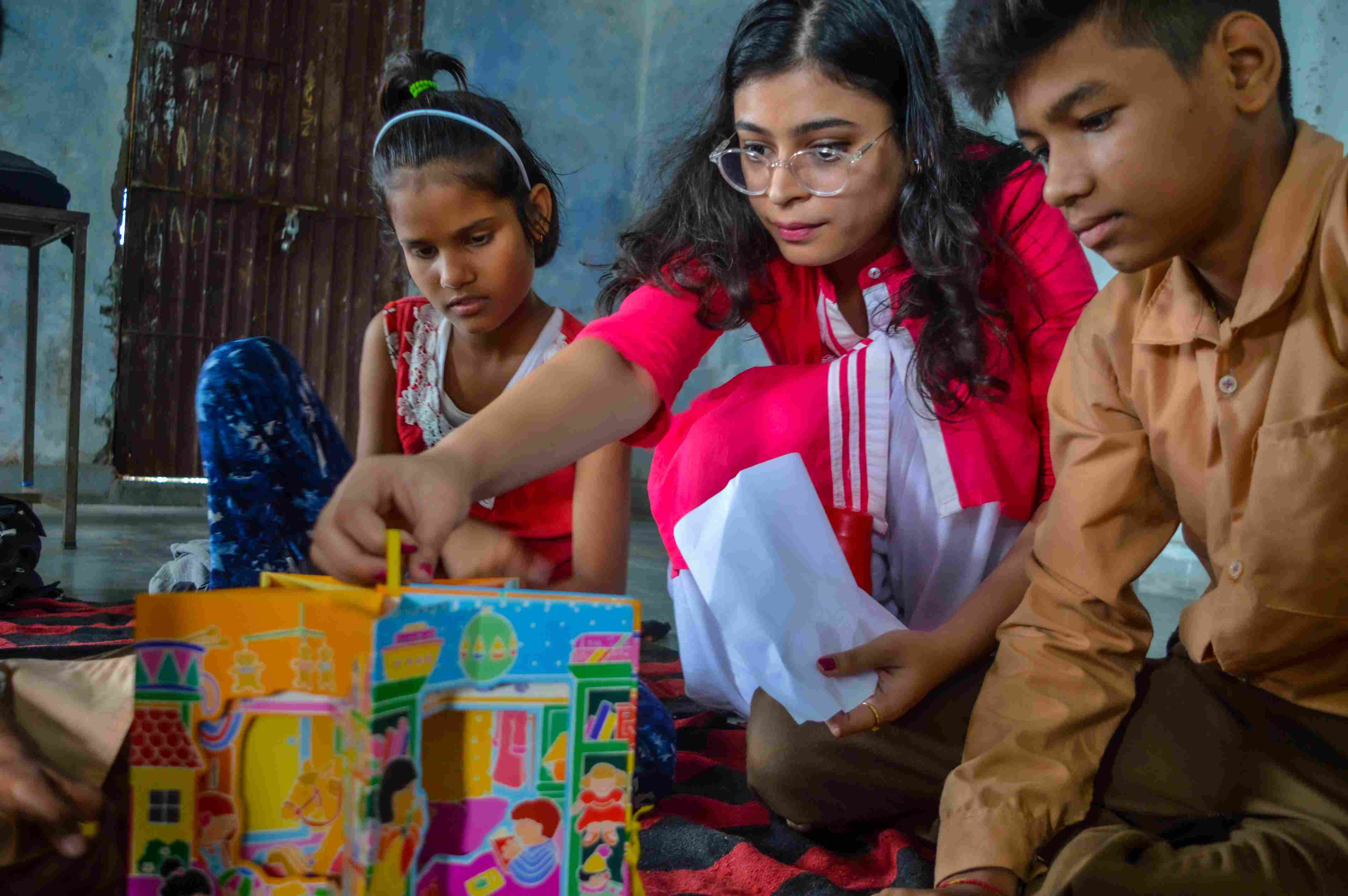
SABIA works with many first-generation learners and they focus on building foundational literacy skills.
“Our storytelling sessions have a theme, and we try to bring out socio-emotional topics. We form a group agreement at the beginning of our programme, and we make a list where everyone is asked what behaviours they would like to see others have. So we include respect, kindness, etc in that list and make a pact to follow through on that for the period of three months that we are there,” says Srishti.
In just a few sessions, the children begin to show significant changes in their attitudes and interactions with one another.
Advertisement
For SABIA, which primarily works with school children aged between six and 14 — many of whom are first-generation learners — the selection of books plays a key role.
“Most of our 14-year-olds aren’t capable of reading at grade level. We bring in books for children starting from the age of four or five; books that would help them build foundational literacy skills,” Srishti explains. The aim is to make sure that children at all reading levels can engage with books, from preschool children to those who are far behind in their academic journey.
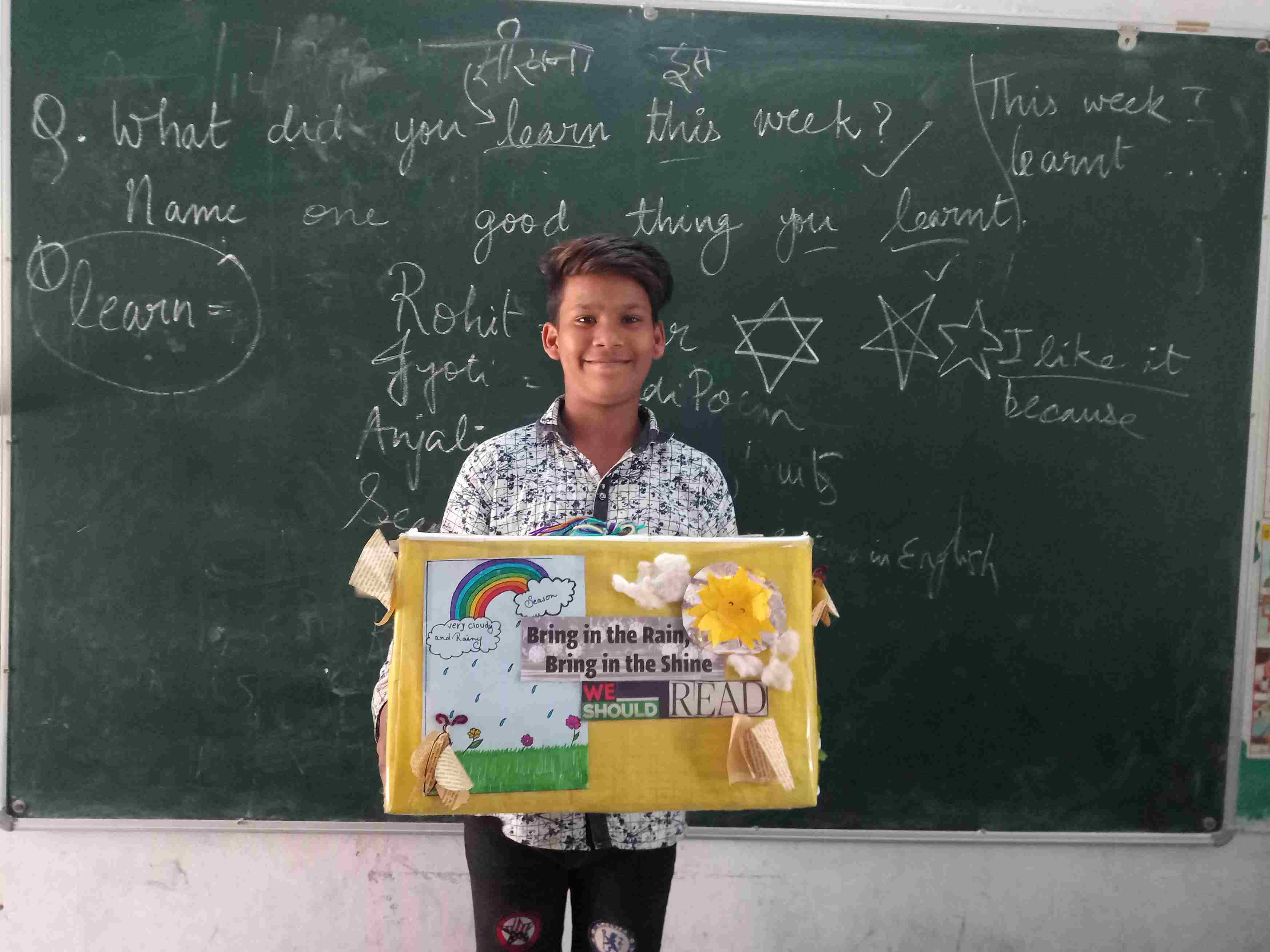
Volunteers work with partnered school students every Saturday, to engage them in activities, arts, and reading.
The foundation also focuses on the use of Hindi and vernacular books to ensure cultural and linguistic relevance. These books are chosen to create a welcoming and fun learning environment, which encourages children to actively engage in the reading process.
This approach is especially important as many of these children come from troubled homes to schools where corporal punishment is still common.
“It’s sad, but the kind of environment they come from and the kind of environment they come to — where they are not heard and their opinions don’t matter — makes learning a challenge,” Srishti points out. By creating a space where children are encouraged to explore, engage, and voice their opinions, SABIA inculcates a love for reading and learning.
“It’s always a rewarding experience to see the students actually be interested in books and learning,” says Suman Mishra, supervisor of Holy Star School in Malad, Mumbai. “Our school is located in a community space, which has always been a challenge in terms of space, and that’s why we didn’t have a dedicated library,” she informs.
Today, Suman is proud that the school has been able to accommodate a library for its children. “When SABIA came, they turned our storeroom, where we kept supplies, into a small library by clearing half of the space and filling it with books our children could make use of.” Since March 2024, about four volunteers have been visiting every Saturday, each working with 10 to 15 children.
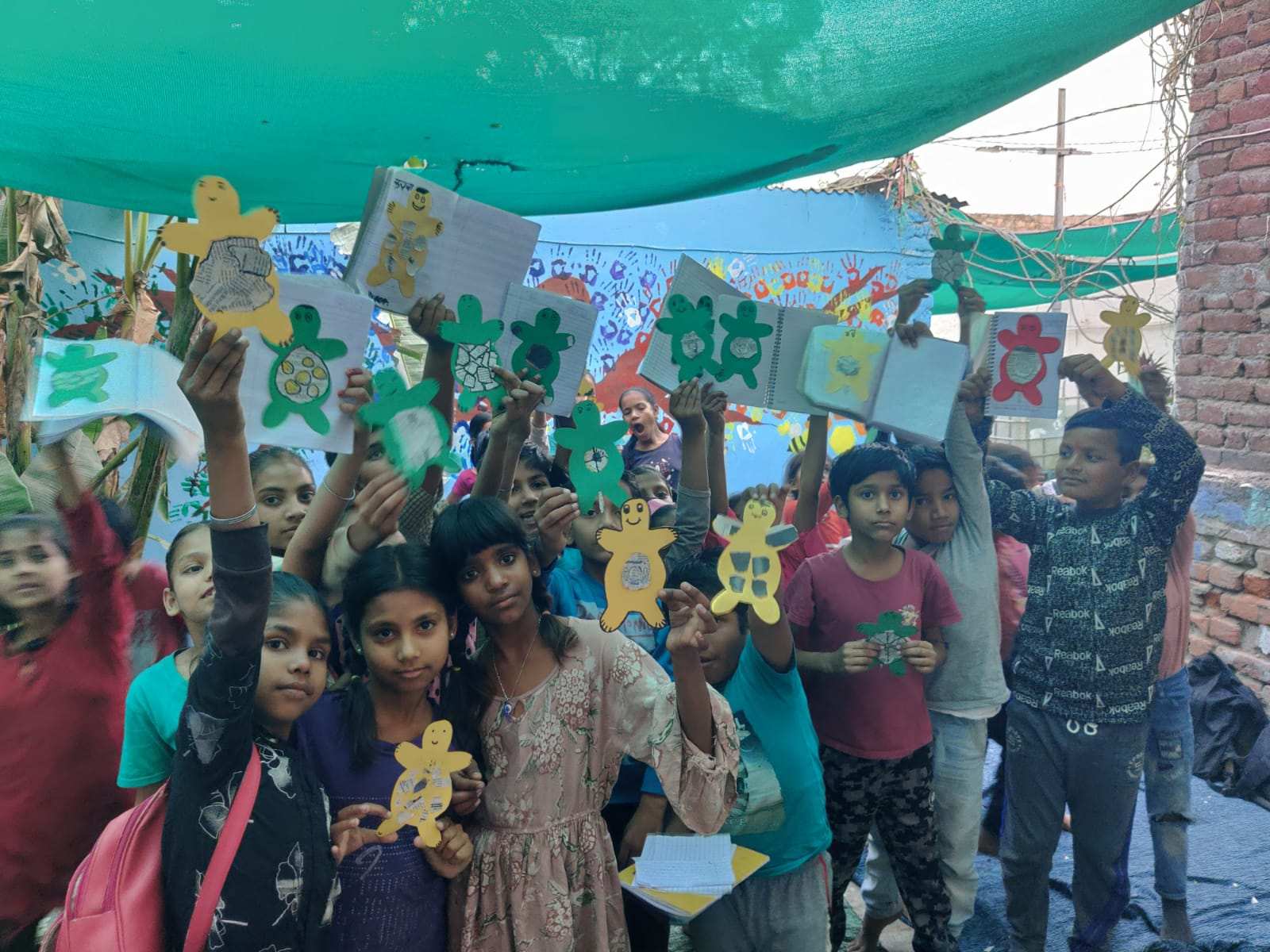
Creating a dynamic and encouraging environment to make learning a better experience for children.
SABIA believes in building a people’s movement where individuals come with the heart and intention of helping, and volunteers form the backbone of the organisation’s operations. In 2024 alone, they had a team of 200 volunteers who worked with and were able to enrich the reading experience for over 500 students in need.
“Backend to frontend, everything is done by volunteers. We have a core team, but only two of us are full-time,” Srishti says.
The foundation has reached over 30,000 children across 175 schools in 16 states. The group’s community libraries in cities like Kota, Jaipur, and Delhi, housing more than 5,000 books, recently welcomed 232 new members. SABIA also improved library spaces in schools across Delhi and Noida, and established its first model school library in Jaipur that houses books and serves as a space where children can learn, creatively engage themselves or study.
In 2023, the organisation hosted in public and low-budget private schools in and around Jaipur, conducted by a team of 14 storytellers. These sessions focused on perspective, empathy, and creative thinking, helping the children develop important life skills and a love for literature.
However, challenges remain. The COVID-19 pandemic highlighted the digital divide that exists in the country, with several children lacking access to the internet or technology for online learning.
“Out of 25,000 children we worked with, only 1,000 could sign up for online sessions, and just 300 were regular,” Srishti admits.
As lockdown measures eased, SABIA managed to set up community spaces and adapt to the situation. “I set up a library space in my own home, and later when I moved to Jaipur, I opened a home library there too. This space was able to keep children engaged in learning even when their school had shut down due to the pandemic,” says Srishti, recounting the story of Anita and Rani — two girls who, despite being out of school for years due to COVID, were able to catch up because they had a supportive learning environment.
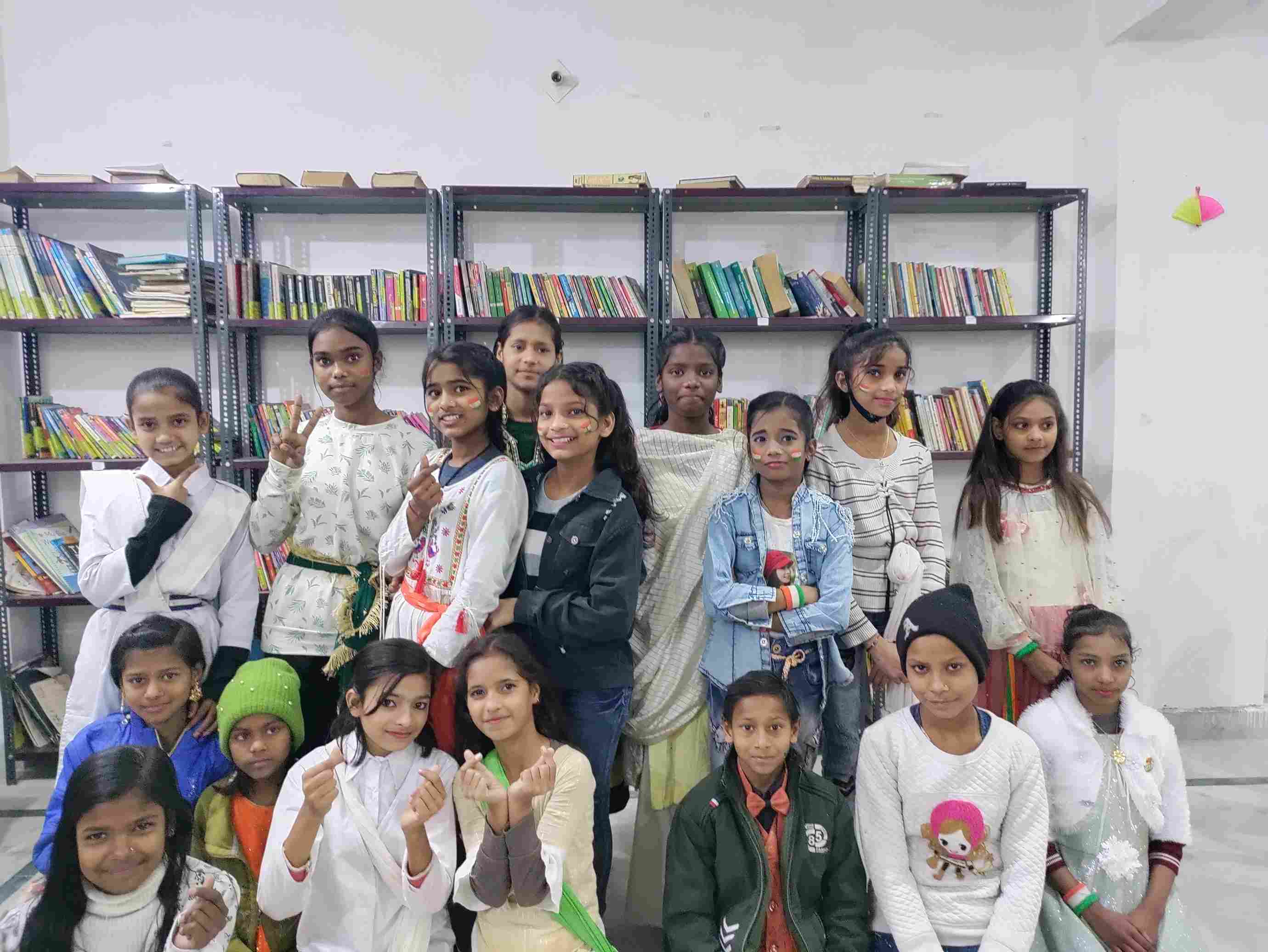
Model Libraries serve as a safe space for students to learn and read.
To continue this work, SABIA relies on project-based funding, even during crowdfunding campaigns. They first identify schools that need help and then share their goals with the public, explaining how people can get involved. They also receive support through Corporate Social Responsibility (CSR) funding, where companies fund specific projects.
For example, in partnership with Hindustan Petroleum, SABIA set up libraries in 20 schools in Kashmir. Government support has also been vital, granting permissions and providing access to schools in areas that need help the most.
In December, SABIA will be hosting a book fair in Mumbai on the 13 and 14 December at the YMCA, Andheri, to raise funds by selling books that were donated to them but were not suitable for their students. SABIA is also set to launch a by the end of the year, ensuring that children with visual impairments have access to books as well.
As they continue to grow, SABIA remains dedicated to empowering children everywhere, ensuring that every child has the opportunity to discover new possibilities through reading.
Edited by Arunava Banerjee; All images courtesy Srishti Parihar
Srishti Parihar, 33, wanted to address this gap. Her efforts would eventually culminate in the Share a Book India Association (SABIA) — an organisation that has been building libraries and hosting donation drives and book fairs along with offering underserved school teaching and educating programmes.

According to the Annual Status of Education Report, 25% of teens aged 14-18 struggle to read grade 2 level text fluently.
As a storyteller and writer, Srishti understands firsthand the transformative power of books. “Storybooks have impacted my life a lot when I was growing up. My love for reading is the reason I was able to do something with my life,” Srishti tells The Better India.
Advertisement
Through SABIA, she wants to help provide every child with access to books, and the ability to comprehend them. In 2024 alone, SABIA has extended its reach to over 30,000 children across 175 schools.
Building a community of readers
A UPSC aspirant and a voracious reader, Srishti was heavily invested in volunteer work. Recalling a conversation she had with a friend who had taken her house-help’s son to be admitted to a school under the Right to Education Act, Srishti says, “My friend mentioned that the children in that government school didn’t have a library. They didn’t have a place to read! That really stuck with me.”
As a product of a privileged education system where access to libraries was a given, many of us fail to consider that such a fundamental resource is missing for so many children. Srishti soon started a Facebook page, then moved to Instagram and formed a strong ‘Bookstagram’ community, where she rallied friends and family to donate books. It was here that they found a group of people who really understood and empathised with the cause.
Advertisement
Eventually, it grew into a full-fledged initiative that now includes a library development programme for rural and remote schools, a teacher training programme, book fairs, and donation drives.
A holistic approach to education
A survey done by SABIA in March 2022 revealed that over 50 government schools in Rajasthan have not been able to implement ‘Padhe Bharat Badhe Bharat’, a government scheme which aims to provide extra reading material and inculcate amongst the students.
“So, even though there is a government scheme that wants to tackle this problem that has been identified, those books are never used,” says Srishti. “This is something that we have been working towards diligently. We are making all stakeholders within the school system, the teachers, and principals understand that it’s okay if the books are used and damaged. Otherwise, it’s pointless to even have them here,” she says.
Advertisement

. “By focusing on social-emotional topics like mutual understanding and respect, we make sure that children improve academically while also developing crucial life skills,” says Srishti.
But it was not just access to books that was a problem.
“The situation was much more grave than we had imagined. Children in Class 8 would not know the alphabet. They were not able to differentiate between a ‘d’ and a ‘b’,” Srishti recalls. “They would recite poems in English because rote learning is embedded in us, but they wouldn’t understand what was being said.”
To fix this, not only does SABIA but they also conduct a library development programme that includes storytelling sessions, activities, and assessments to monitor the children’s progress.
Advertisement
“When we find out their grade level, most are at 0 or 1,” Srishti shares. This programme works to increase children’s reading levels and foster a positive, active relationship with books. “By focusing on social-emotional topics like mutual understanding and respect, we make sure that children improve academically while also developing crucial life skills,” she says.

SABIA works with many first-generation learners and they focus on building foundational literacy skills.
“Our storytelling sessions have a theme, and we try to bring out socio-emotional topics. We form a group agreement at the beginning of our programme, and we make a list where everyone is asked what behaviours they would like to see others have. So we include respect, kindness, etc in that list and make a pact to follow through on that for the period of three months that we are there,” says Srishti.
In just a few sessions, the children begin to show significant changes in their attitudes and interactions with one another.
Advertisement
For SABIA, which primarily works with school children aged between six and 14 — many of whom are first-generation learners — the selection of books plays a key role.
“Most of our 14-year-olds aren’t capable of reading at grade level. We bring in books for children starting from the age of four or five; books that would help them build foundational literacy skills,” Srishti explains. The aim is to make sure that children at all reading levels can engage with books, from preschool children to those who are far behind in their academic journey.

Volunteers work with partnered school students every Saturday, to engage them in activities, arts, and reading.
The foundation also focuses on the use of Hindi and vernacular books to ensure cultural and linguistic relevance. These books are chosen to create a welcoming and fun learning environment, which encourages children to actively engage in the reading process.
This approach is especially important as many of these children come from troubled homes to schools where corporal punishment is still common.
“It’s sad, but the kind of environment they come from and the kind of environment they come to — where they are not heard and their opinions don’t matter — makes learning a challenge,” Srishti points out. By creating a space where children are encouraged to explore, engage, and voice their opinions, SABIA inculcates a love for reading and learning.
A world of stories
“It’s always a rewarding experience to see the students actually be interested in books and learning,” says Suman Mishra, supervisor of Holy Star School in Malad, Mumbai. “Our school is located in a community space, which has always been a challenge in terms of space, and that’s why we didn’t have a dedicated library,” she informs.
Today, Suman is proud that the school has been able to accommodate a library for its children. “When SABIA came, they turned our storeroom, where we kept supplies, into a small library by clearing half of the space and filling it with books our children could make use of.” Since March 2024, about four volunteers have been visiting every Saturday, each working with 10 to 15 children.

Creating a dynamic and encouraging environment to make learning a better experience for children.
SABIA believes in building a people’s movement where individuals come with the heart and intention of helping, and volunteers form the backbone of the organisation’s operations. In 2024 alone, they had a team of 200 volunteers who worked with and were able to enrich the reading experience for over 500 students in need.
“Backend to frontend, everything is done by volunteers. We have a core team, but only two of us are full-time,” Srishti says.
The foundation has reached over 30,000 children across 175 schools in 16 states. The group’s community libraries in cities like Kota, Jaipur, and Delhi, housing more than 5,000 books, recently welcomed 232 new members. SABIA also improved library spaces in schools across Delhi and Noida, and established its first model school library in Jaipur that houses books and serves as a space where children can learn, creatively engage themselves or study.
In 2023, the organisation hosted in public and low-budget private schools in and around Jaipur, conducted by a team of 14 storytellers. These sessions focused on perspective, empathy, and creative thinking, helping the children develop important life skills and a love for literature.
Challenges, and the road ahead
However, challenges remain. The COVID-19 pandemic highlighted the digital divide that exists in the country, with several children lacking access to the internet or technology for online learning.
“Out of 25,000 children we worked with, only 1,000 could sign up for online sessions, and just 300 were regular,” Srishti admits.
As lockdown measures eased, SABIA managed to set up community spaces and adapt to the situation. “I set up a library space in my own home, and later when I moved to Jaipur, I opened a home library there too. This space was able to keep children engaged in learning even when their school had shut down due to the pandemic,” says Srishti, recounting the story of Anita and Rani — two girls who, despite being out of school for years due to COVID, were able to catch up because they had a supportive learning environment.

Model Libraries serve as a safe space for students to learn and read.
To continue this work, SABIA relies on project-based funding, even during crowdfunding campaigns. They first identify schools that need help and then share their goals with the public, explaining how people can get involved. They also receive support through Corporate Social Responsibility (CSR) funding, where companies fund specific projects.
For example, in partnership with Hindustan Petroleum, SABIA set up libraries in 20 schools in Kashmir. Government support has also been vital, granting permissions and providing access to schools in areas that need help the most.
In December, SABIA will be hosting a book fair in Mumbai on the 13 and 14 December at the YMCA, Andheri, to raise funds by selling books that were donated to them but were not suitable for their students. SABIA is also set to launch a by the end of the year, ensuring that children with visual impairments have access to books as well.
As they continue to grow, SABIA remains dedicated to empowering children everywhere, ensuring that every child has the opportunity to discover new possibilities through reading.
Edited by Arunava Banerjee; All images courtesy Srishti Parihar
